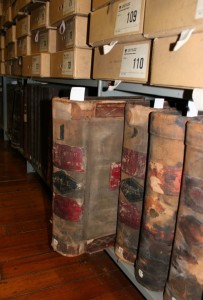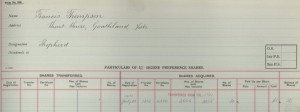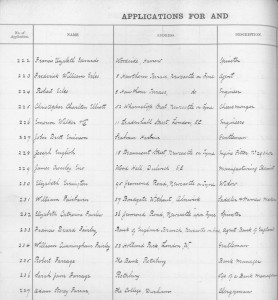I’m pleased to report that work is progressing well on the ‘Workshop of the World’ project to catalogue our Vickers Armstrong archives collection. I’ve recently been working on the Executive records of Sir W.G. Armstrong Whitworth and Company Ltd, which include Board of Directors minutes, annual reports and registers of shareholders. Tyne & Wear Archives holds over two hundred registers of shareholders in the collection, some of them very large.
The registers contain details of the company’s shareholders from 1882 up to 1943. The volumes contain a separate page for each shareholder, giving their name, address and occupation together with details of the shares they held. There’s an interesting example below for a shepherd from Yorkshire.
The Archives holds shareholders registers in quite a few of our business collections. They have traditionally not been used much by researchers but I anticipate that this will change in the years to come. To get an idea of the research potential of shareholders registers, I recently sought the advice of Dr Tom McGovern of the Newcastle University Business School and his research partner Tom McLean, Senior Lecturer in Accounting at the University of Durham. Dr McGovern explained that information about shareholders:
“… is a subject of interest to researchers with an interest in wealth, power and regional elites, governance, female shareholders, etc. The Vickers Armstrong Company was also a major UK company whose documents are of considerable interest to historians”.
Their advice was very useful and is a good example of how archivists and academics can work together to share knowledge and insights about archive collections.
The registers are also potentially a useful source of information for family historians. Investing in shares wasn’t just for the wealthiest sections of society such as gentlemen, army officers, merchants, solicitors and surgeons (although the registers contain plenty of them). Shareholders came from a variety of backgrounds and the occupations listed in the Armstrong Whitworth registers include butchers, bakers, butlers, cheesemongers, joiners and labourers to name a few.
It’s interesting to note that a number of the smaller shareholders (sometimes holding just one or two shares) were employees of the firm. You can find quite a few such examples in the earliest share allotment book, dating from 1882 (TWAM ref. DS.VA/1/51/1). Men such as Joseph English an engine fitter in no. 29 shop at the Elswick Works.
If you think that your ancestors may have owned shares then it might be worth visiting the Archives to look through the registers we hold. The registers could give you an insight into their financial affairs and help to chart the rise and fall of their fortunes. If you visit our searchroom to search our records then I can assure you of a warm welcome. You can see details of our location and opening times on our website.



2 Responses to Did your ancestors own shares?